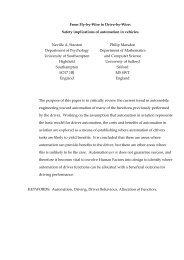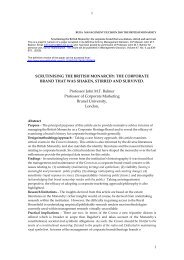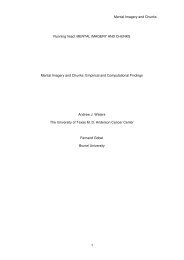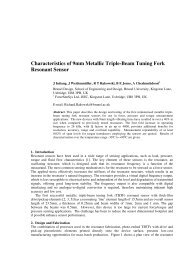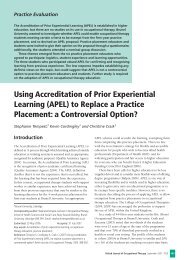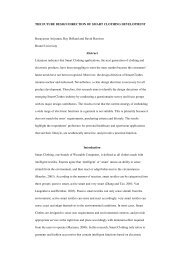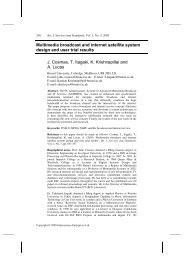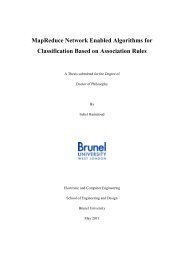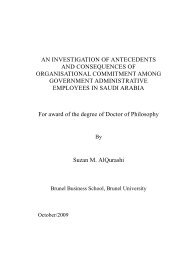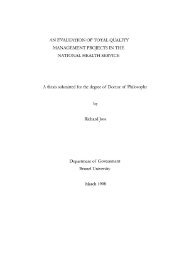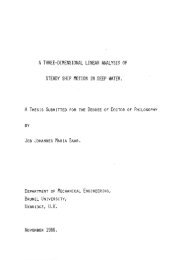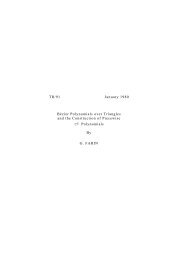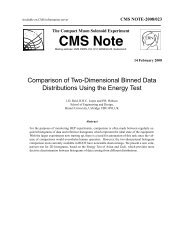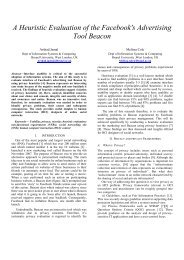Chapter 1 - Brunel University
Chapter 1 - Brunel University
Chapter 1 - Brunel University
You also want an ePaper? Increase the reach of your titles
YUMPU automatically turns print PDFs into web optimized ePapers that Google loves.
<strong>Chapter</strong> 2: Literature Review<br />
businesses, employees and other stakeholders: Tian and Tainfield, (2003) define e -<br />
government from four different viewpoints : (a) Information Technology (IT), (b)<br />
government service, (c) government efficiency and (d) political view. In addition,<br />
(as has already been stated), the definition of e-government varies according to the<br />
goals, culture and values of a community.<br />
The following Table 2.1 illustrates different classifications of e-government, for<br />
both broad and narrow perspectives.<br />
Table 2.1:<br />
E-government Perspectives<br />
Perspective References<br />
Information Technology Lambrinoudakis et al., (2003)<br />
Process Bonham et al., (2001)<br />
Benefits Whitson and Davis, (2001); Katzen, (2000)<br />
Citizen Focus Burn and Robins, (2003)<br />
Single Point Access Ke and Wei, (2004); UNDPEPA/ASPA, (2002)<br />
Phenomenon Riley, (2001)<br />
Definitions related to the above-mentioned e-government perspectives are illustrated<br />
in the following Tables.<br />
Table 2.2:<br />
Definitions Focusing on the Use of Information Technology<br />
Definitions/Description – Information Technology Characteristics References<br />
―E-government refers to the use of IT by government<br />
agencies (such as Wide Area Networks, the Internet,<br />
and mobile computing) that have the ability to transform<br />
relations with citizens, businesses, and other arms of<br />
government. These technologies can serve a variety of<br />
different ends: better delivery of government services to<br />
citizens, improved interactions with business and<br />
industry, citizen empowerment through access to<br />
information, or more efficient government management.<br />
The resulting benefits can be less corruption, increased<br />
transparency, greater convenience, revenue growth,<br />
and/or cost reductions‖.<br />
―E-government is the term used to reflect the use of ICT<br />
in public administration in an attempt to ease access to<br />
governmental information and services for citizens,<br />
business and government agencies‖. Furthermore, there<br />
is always a target to improve the quality of the services<br />
and to provide greater opportunities for participating in<br />
democratic institutions and processes‖.<br />
―E-government encompasses applications of various<br />
technologies to provide citizens and organisations with<br />
more convenient access to government information and<br />
services; and to provide delivery of public services to<br />
citizens, business partners and suppliers, and those<br />
working in the public sector.‖<br />
Focus is on utilising IT<br />
to deliver government<br />
services, improve<br />
interactions and<br />
effective management.<br />
Focus is on ICT usage<br />
for providing access to<br />
government<br />
information.<br />
Focus is on<br />
Information<br />
Technology to provide<br />
citizens with<br />
government<br />
information and<br />
services.<br />
World Bank<br />
Group, (2004)<br />
Lambrinoudakis<br />
et al., (2003)<br />
Turban et al.,<br />
(2002)<br />
Shafi Al-Shafi 19



